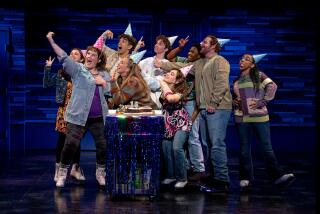Review: In ‘Finding Neverland’ at the Pantages, pirates and pixie dust obscure the show’s secret weapon: Sorrow
The touring production of “Finding Neverland,” about how J.M. Barrie came to write “Peter Pan” in the early 1900s, may well inspire a new generation of young playwrights. The highly romanticized musical, directed by Tony winner Diane Paulus (“Pippin,” “The Gershwins’ Porgy and Bess,” “Hair”) and now at the Hollywood Pantages Theatre, makes writing look like a nonstop thrill ride, not to mention a great workout and a probing form of therapy.
Barrie (Billy Harrigan Tighe) is a successful playwright who never sits at a desk. It’s not clear that he even carries a pen. One day, in a bit of a creative slump, he meets the four fatherless Llewelyn Davies boys and their lovely, widowed, coughing mother, Sylvia (Christine Dwyer) in London’s Kensington Park. Joining in their make-believe games reawakens Barrie’s own imagination, which whisks him off to Neverland (courtesy of Scott Pask’s pretty set and Jon Driscoll’s sumptuous projections). The next thing Barrie knows, he’s got a sheaf of pages and a hit play.
True, the process takes a bit longer than Barrie’s producer, a font of one-liners named Charles Frohman (the charming Tom Hewitt, channeling Kelsey Grammer, who played the role on Broadway) would like. Frohman criticizes Barrie’s drafts, at one point shaking his walking cane in the writer’s face and saying, “You don’t even have a villain!” A spotlight casts the shadow of the cane’s handle, and soon Captain Hook (also played by Hewitt, with a generous helping of ham) bursts out of Barrie’s subconscious, claiming to be his dark alter ego and growling insightful script notes in his pirate’s brogue: “Children love to be scared. They just don’t know it yet!”
In this moment, the audience is invited to experience the transformation of life into art, that mysterious alchemy by which a fleeting impression can become an enduring myth. “Finding Neverland,” based on the 2004 Marc Foster film starring Johnny Depp and Kate Winslet, is filled with clues, like a detective story, designed to resonate with “Peter Pan” lovers and make us feel complicit in dreaming up the story of the boy who refused to grow up.
At a stuffy dinner party thrown by Barrie’s shrill, child-hating wife, Mary (Crystal Kellogg), the irrepressible Peter Llewellyn Davies (Ben Krieger) reflects a dancing light onto the wall with his spoon: There’s Tinkerbell! Peter Pan’s prepubescent yearnings for Wendy are inspired by Barrie’s feelings for Sylvia. The conceit that every fictional invention is a spin on a real-life event clearly appeals to Harvey Weinstein, producer of the film and the musical. (“Finding Neverland” was his first Broadway outing as lead producer.)
And it certainly is appealing to think that any of us could write a great play if we just dressed up our autobiographies with buccaneer paraphernalia. The ability to do so is described by James Graham’s book and Gary Barlow & Eliot Kennedy’s score as “imagination,” and Barrie spends much of his time onstage frantically urging everyone else to use it. After the show, I was surprised to see that only one musical number is actually titled “My Imagination,” as the word is sung throughout, often in strained rhyme with “invitation.”
SIGN UP for the free Essential Arts & Culture newsletter »
The horror of passersby whenever Barrie invites them to his imagination shows us that he inhabits an imagination-hating age; without him, it seems, imagination might go extinct. Yet the more he sings about it, the more nebulous the term becomes. What is imagination? Not, evidently, a function of the human brain. It involves pirates — beyond that, I couldn’t tell you.
In fact, the whole battle for imagination may be a red herring to distract us from the deeper flaw in “Finding Neverland,” which Frohman could have diagnosed: It doesn’t have a villain. Yes, multiple would-be villains present themselves, but the story seems so afraid of bringing us down that it makes the villains reassuringly silly or converts them to friends — often during the course of one song.
Mary seems like a promising foil initially, resenting her husband’s new friends and flirting with a fop, so he divorces her. The actors in Frohman’s company are scandalized by the whimsy of “Peter Pan.” Plays shouldn’t involve flying, or dogs, or crocodiles that swallow clocks, they protest. (Really? They’re actors.) But as soon as Frohman, good at heart despite his profit motives, reminds them that a play is about playing, they get on board.
Not even mortality has a chance against Barrie’s imagination here. The boys have recently lost their father, and Sylvia coughs so much that she can’t attend opening night of “Peter Pan.” So Barrie arranges for the play to be performed for her in the very nursery that inspired it, incorporating a breathtaking death scene just for her. Amid a cascade of glittering pixie dust, she’s ushered out into the starry night by the laughing green-clad sprite, leaving only her lacy shawl twirling in the breeze.
Nobody seems that broken up afterward, maybe because it was such a lovely way to go. Or maybe because the play’s real love story is between Barrie and the troubled but sweet Peter Llewelyn Davies.
This is an implication that “Finding Neverland” so scrupulously avoids, even when Barrie is climbing into the boys’ nursery window late at night, that it seems uncharitable to bring it up here. We can accept that the late-Victorian era had far more tolerance for middle-aged bachelors gamboling with children, but we can’t entirely quash the uneasiness the phenomenon provokes.
The bombastic cheerfulness of “Finding Neverland” does its best to distract us from the darkness at the heart of “Peter Pan”: It’s a story about orphans and grieving mothers. If only the creative team were willing to let the secret sorrow and pain grab hold of us.
‘Finding Neverland’
When: 8 p.m. Tuesdays through Fridays, 2 and 8 p.m. Saturdays, 1 and 6:30 p.m. Sundays, through March 12 at the Hollywood Pantages Theatre, 6233 Hollywood Blvd., Los Angeles. Also playing March 21 to April 2 at Segerstrom Center for the Arts, 600 Town Center Drive, Costa Mesa.
Cost: $35 and up at the Pantages; $29 and up at Segerstrom
Info: www.HollywoodPantages.com, www.scfta.org
Running time: 2 hours, 40 minutes
Follow The Times’ arts team @culturemonster.
ALSO
‘Fun Home’ composer Jeanine Tesori hears the music in everyday life
‘The Humans’ and David Henry Hwang musical lead Ahmanson’s 2017-18 season
Geffen Playhouse announces 2017-18 season with Neil LaBute, Tyne Daly
‘Come From Away,’ ‘Amélie’ and the long road from West Coast to Broadway
‘Balls,’ the opera about Billie Jean King’s ‘Battle of the Sexes’
UPDATES:
11:30 a.m. Feb. 27: This article was updated with show dates and ticket information for Segerstrom Center for the Arts.
More to Read
The biggest entertainment stories
Get our big stories about Hollywood, film, television, music, arts, culture and more right in your inbox as soon as they publish.
You may occasionally receive promotional content from the Los Angeles Times.










